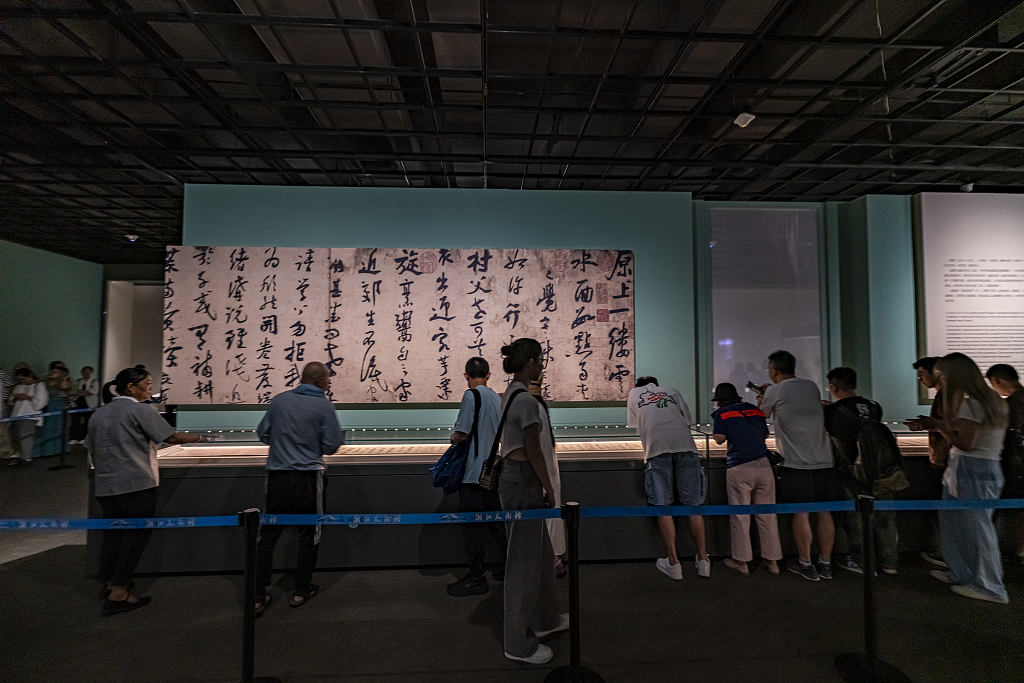
The site of 2022 China (Qufu) International Confucius Cultural Festival and the Eighth Nishan Forum on World Civilizations in Qufu, the birthplace of Confucius, in east China's Shandong Province, September 27, 2022. /Xinhua
The site of 2022 China (Qufu) International Confucius Cultural Festival and the Eighth Nishan Forum on World Civilizations in Qufu, the birthplace of Confucius, in east China's Shandong Province, September 27, 2022. /Xinhua
Editor's note: Karl-Heinz Pohl, a special commentator on current affairs for CGTN, is a professor of Chinese Studies at Trier University in Germany, and the director of the Confucius Institute Trier. The article reflects the authors' opinions and not necessarily the views of CGTN.
As a German sinologist who began his studies at the University of Hamburg in 1970, I have preoccupied myself with understanding China – its intellectual history, ethics, and aesthetics – for 53 years. In the following, I want to highlight some aspects of Chinese civilization that I see to be important, such as Confucianism, Chinese aesthetics and the role of cross-cultural dialogue.
Although it was highly revered in Europe during the Enlightenment (17th–18th centuries), Confucianism fell into oblivion in Europe after the French Revolution or was only received negatively, as it was by the Chinese intellectuals of the May Fourth Movement, namely as the hallmark of an ossified social system. Today, not many people in Europe and America understand Confucianism.
In this respect, it is important to re-emphasize the positive sides of Confucianism, and I am greatly indebted to Tu Weiming, a Chinese-born American philosopher who has brought back to light the side of Confucianism that had faded away for a long time, namely that Confucianism is a tradition not only of wisdom, but also of high ethical standards, and that, in addition, it has an almost spiritual tradition, namely in the emphasis on self-cultivation, known as "xiuyang" in Chinese, which is basically the core of Confucianism. Thus, Confucianism has a spiritual dimension and could well have significance for today's world.
As far as the influence of Confucianism in China is concerned, the first thing to examine and compare with that of the West would be the "concept of man," for major differences are already apparent here. The concept of man in the European/American West is that of the individual. From its Latin origin, the word means: the ultimate "indivisible" – just as an atom used to be imagined. This "indivisible" stands alone and has certain rights by nature. It is therefore an "atomistic" view of human beings: we are all atoms, the last indivisible units that stand alone.
The image of man in China, however, is that of man as a "relational being." We can only live our humanity by having and cultivating relationships: first as children of parents, then as parents of children, brothers and sisters, relatives, friends, compatriots, etc. This is one of the main differences between China and the West.
If one wants to understand China better, one also must understand the role of aesthetics in China. Aesthetics was initially a Western import into China. When the Chinese began to engage with Western culture at the turn of the 1900s, Chinese intellectuals found that the West was shaped by religion (Christianity), whereas China was shaped by aesthetics. Aesthetics was, thus, understood as the functional equivalent of religion. Hence, Cai Yuanpei demanded "Aesthetic education instead of religion!" Lin Yutang also said in his book My Country and My People that "Poetry may well be called the Chinaman's religion."
Furthermore, the Chinese language or script has an aesthetic dimension through the characters alone – and through calligraphy – that is completely unknown in the West. Calligraphy is related to painting and poetry, which also have a very different and distinct appeal in China. The aesthetic peculiarities of Chinese poetry are unfortunately lost in translation. Therefore, the appreciation of Chinese poetry is very limited in the West.

Tourists browse Chinese calligraphy works from the Song Dynasty, at the Zhejiang Art Museum in Hangzhou, east China's Zhejiang Province, September 17, 2023. /CFP
Tourists browse Chinese calligraphy works from the Song Dynasty, at the Zhejiang Art Museum in Hangzhou, east China's Zhejiang Province, September 17, 2023. /CFP
Despite this limitation due to the loss of aesthetic features, Chinese poetry, when it was discovered in Europe around 1900, exerted an enormous attraction on European and American artists. The American Imagists around Ezra Pound were influenced by it. In Europe, Gustav Mahler wrote a great symphonic cantata, "The Song of the Earth," based on poems by Li Bai, Meng Haoran, Wang Wei, and others.
Finally, Yin-Yang-thought plays a very important role: it promotes a pattern of thinking of balance. One looks for complementary parallels instead of opposites. The Chinese script with characters and Yin-Yang-thought have thus led to a special feature in Chinese culture: parallelism in poetry and parallel sayings, or "duilian" in Chinese, which can be found everywhere on pillars in temples or on doorposts. These are peculiarities that do not exist at all in the West – and are not understood here. Therefore, aesthetics plays a different role in China than in the West.
In the West, aesthetics is a sub-discipline of philosophy that is hardly taken notice of anymore. It is something for a few specialists, and books on aesthetics don't have any influence on society. In China, on the other hand, aesthetics has an essential connection to China's cultural self-understanding – or to a Chinese identity. Something like an "aesthetics fever" (as in the 1980s, triggered by the publication of Li Zehou's The Path of Beauty) is unthinkable in the West.
Against this background, the question arises as to what a cross-cultural dialogue between China and the West could do. There is a lot of controversy around the topic of "cross-cultural dialogue." Some consider it an abstract thing without substance. However, "dialogue" should not be understood here in a narrow sense, but in a broader one, namely as an effort in understanding.
First of all, our human relationships are dialogical, i.e., we need the "other" in order to experience ourselves as "ourselves." This also applies to cultures insofar as one can actually only experience one's own culture in contrast to another. For example, we only start thinking about our mother tongue when we start learning another language. In this respect, cross-cultural dialogue should be seen as an effort for understanding that can take place at all levels, between individuals, between politicians, members of religions, in the media. Such efforts in understanding should be based, above all, on a sense of equality and mutual respect.
A cross-cultural dialogue can only be fruitful if one is first interested in the other and if one knows something about it. However, too little has been translated from Chinese into Western languages. In fact, the West doesn't understand the otherness of China at all – to most Westerners, China is like a black box: too little is known about China. Some Chinese literature and philosophy have been translated over the last 100 years, but only sinologists know about it, and they are only few and have little influence. At school in the West, next to nothing is learned about China.
Conversely, it is quite different, though: Chinese intellectuals have studied Europe and its culture intensively since the Opium Wars. Thus, they are familiar with two worlds. Westerners know only one world: their own. In this respect, the Chinese do actually have an advantage. It's just not much use to them, because the West, through its military, economic, financial, and cultural power, has managed over the last centuries to make the world think and live according to its own standards. Hence, there is a basic asymmetry in the relationship between the West and the rest (including China) that a cross-cultural dialogue could address – and try to overcome.
(If you want to contribute and have specific expertise, please contact us at opinions@cgtn.com. Follow @thouse_opinions on Twitter to discover the latest commentaries in the CGTN Opinion Section.)